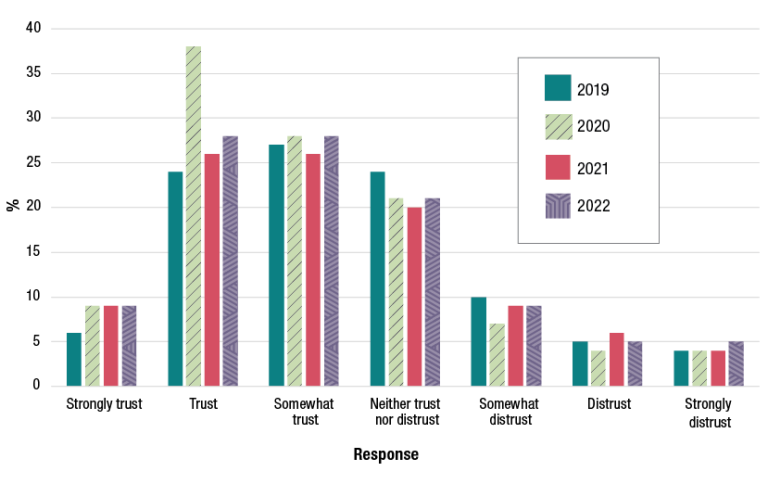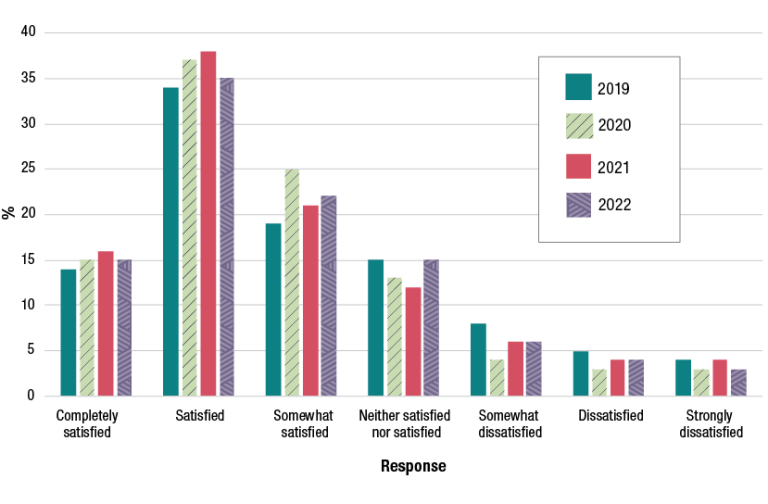1. 1 Trust and Australian public services
'There has been a significant decline internationally in trust in democracies and the institutions that represent those democratic systems. Winning back people's trust is a key challenge facing our government and its institutions.'
- Senator the Hon Katy Gallagher, Minister for the Public Service[3]
The inaugural Organisation for Economic Co-operation and Development (OECD) Survey on the Drivers of Trust in Public Institutions is a new measurement tool for democratic governments seeking to improve public confidence in government reliability, responsiveness, integrity, fairness and openness.[4] This survey found that public confidence is evenly split between people who trust their national government and those who do not. Disadvantaged groups with less real or perceived access to opportunity are particularly likely to report low levels of trust in government. This has implications for Australia as we seek to address systemic inequality through changes to the delivery of policies, programs and services as well as national dialogues to build a more cohesive society.[5]
Noting that it takes a long time to rebuild trust once it is diminished, the OECD calls for 'countries to urgently reinvest in re-establishing trust to tackle the policy challenges ahead.'[6]
To meet citizens’ increasing expectations, the study argues that OECD governments must enhance integrity and fight undue influence. They must also credibly address long-term challenges, evaluate and communicate the effects of reforms, develop better governance models for information ecosystems, and monitor public trust in institutions.[7]
To support the Government to deliver on its resolve means emphasising the Westminster traditions which underpin the APS. This includes frank and fearless advice and preparing for the future by building the capabilities needed to deliver modern people-focused policy and service solutions.
Australian public services
The first annual report of the Survey of Trust in Australian Public Services was published in 2022 (previously known as the Citizen Experience Survey). Australian public services include those delivered by the Australian Tax Office, Centrelink, National Disability Insurance Agency and Medicare. Since March 2019, the Department of the Prime Minister and Cabinet (PM&C) has collected people’s feedback through the survey to provide robust, regular data on experiences of Australian public services. In 2021–22, the survey was conducted in 12 monthly waves, with approximately 1,000 Australians participating in each wave. The high-level results were published twice annually.
From July 2021 to June 2022, levels of trust in Australian public services remained stable. In 2022, 61% of Australians 'strongly trust', 'trust' or 'somewhat trust' these services (Figure 1.1). This represents an improvement on pre-pandemic levels, but there is still much room for improvement.
Over the past few years, natural disasters have meant that many people who have not previously relied on government assistance have engaged with Australian public services for the first time. The survey showed that people who access government services are more likely to trust them (63%) than people who have not accessed any services (57%). Given accessing and using public services is a key factor influencing public trust, continuing to improve experiences of these services is important.
Trust is also variable depending on location, gender and cultural background, highlighting opportunities to improve services in regional areas and support specific groups.
People in regional Australia tend to trust services less (56%) than those in metro areas (63%). Women trust Australian public services significantly less (57%) than men (65%). Migrant Australians, however, have significantly higher trust in Australian public services (68%) than people born in Australia (59%).
Figure 1.1: Trust in Australian public services (2019 to 2022)

Source: PM&C Survey of Trust in Australian public services
The survey also measures how satisfied people are with the Australian public services they accessed in the last 12 months. From July 2021 to June 2022, satisfaction was stable and remained higher than before the COVID-19 pandemic. In 2022, 73% of Australians reported feeling 'completely satisfied', 'satisfied' or 'somewhat satisfied' with their experience (Figure 1.2).
More people aged 65 and over are satisfied with public services (78%) than other age groups (73% for 35 to 64 and 70% for 18 to 34). People with disability are less satisfied with all public services they use (64%) than people without disability (75%). Unemployed people are more dissatisfied with public services (18%) than employed people (11%). In October 2022, the Government committed to making more survey information
publicly available.
Figure 1.2: Satisfaction with Australian public services (2019 to 2022)

Source: PM&C Survey of Trust in Australian public services
Overall, people’s trust in and satisfaction with Australian public services was steady over 2022, stabilising above pre-COVID-19 pandemic levels. Looking to the future, most people (62%) trust these services to make the changes required to meet the needs of all Australians.
Based on survey results, it is clear that building trust and confidence in the APS requires ongoing effort and a constant, robust focus on integrity and ethical behaviours.
Results of the 2022 APS Employee Census suggest the APS is positioned to help build citizens’ trust and satisfaction with public services. A vast majority of employees (92%) understand how their role contributes to achieving an outcome for the Australian public, and 85% believe strongly in the purpose and objectives of the APS. This serves as a strong foundation for the continued improvement of services and increased trust.

|
Read more about the Survey of Trust in Australian public services |
Footnotes
[3] PM&C (Department of the Prime Minister and Cabinet), Albanese Government’s APS Reform agenda, 13 October 2022.
[4]OECD (Organisation for Economic Co-operation and Development), Building Trust to Reinforce Democracy: Main Findings from the 2021 OECD Survey on Drivers of Trust in Public Institutions, 13 July 2022
[5] NIAA (National Indigenous Australians Agency), Referendum on an Aboriginal and Torres Strait Islander Voice, n.d.
[6] OECD (Organisation for Economic Co-operation and Development), Building Trust to Reinforce Democracy: Main Findings from the 2021 OECD Survey on Drivers of Trust in Public Institutions, 13 July 2022.
[7] ibid.



